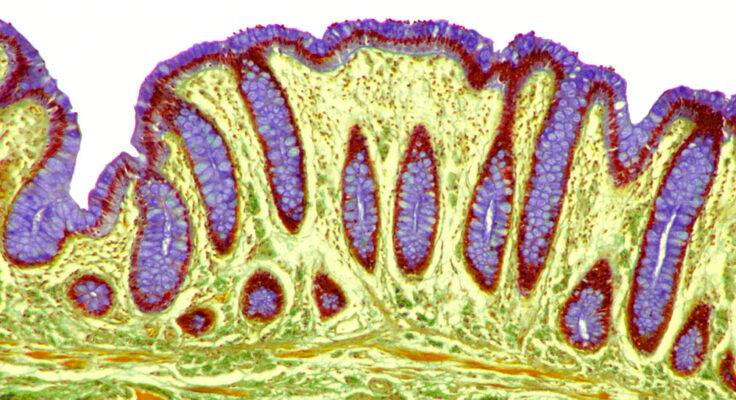The Kenneth Rainin Foundation invests in innovative research to advance the prevention, diagnosis and treatment of Inflammatory Bowel Disease (IBD). We believe the beginning of a research idea is where we can make the greatest impact. And the closer that impact comes to improving patients’ lives, the better. Finding a cure is our ultimate aim, but short of that, what IBD patients want is to heal and have the best quality of life possible.
“Our Health strategies aim to support translational science led by innovative researchers that will bring clinical applications to patients sooner.”
Our Health strategies aim to support translational science led by innovative researchers that will bring treatments to patients sooner. That’s why we are excited that Thetis Pharmaceuticals has reached a new regulatory milestone. We made early Program Related Investments in its development of a novel therapy for ulcerative colitis. Late last year, the Food & Drug Administration (FDA) granted orphan drug designation for TP-317, a small molecule, oral therapy for treatment of pediatric ulcerative colitis. TP-317 is promising because it resolves inflammation without suppressing the body’s immune function.
Mucosal Healing And Resilience
Although ulcerative colitis can present at any age, it typically begins in teenagers and young adults. Various studies estimate between 63,000 and 110,000 cases of pediatric ulcerative colitis in the US, with a majority in occurring in children aged 10 to 17. This rare, chronic inflammatory disease affects the colon and is characterized by painful and debilitating flare-ups and remission. Children with this disease often experience complications related to growth, development, nutrition, pubertal maturation, bone mineral density accretion and psychological impacts. They face a lifetime of chronic illness.
Currently available medications alleviate inflammation and reduce symptoms, providing relief for countless IBD patients. But these drugs and biologics do not provide a cure or prevent long-term complications. They typically work by suppressing the immune response and can have serious adverse effects, including increased risk of severe infection.
“The Foundation wants to advance IBD therapies that not only increase remission and contain inflammation, but help IBD patients to heal.”
Thetis Pharmaceuticals is designing a different, two-pronged therapeutic approach that reduces inflammation and promotes mucosal healing—a vital, immune-based mechanism. The more that patients can heal, the more robust and resilient they are if flare-ups happen again.
A Transformative Technology
Recognizing the potential in Thetis Pharmaceuticals’ preclinical development of TP-317, the Rainin Foundation made two Program Related Investments in its research. The Foundation wants to advance IBD therapies that not only increase remission and contain inflammation but help IBD patients to heal. What distinguishes TP-317 from other IBD drugs is that it resolves inflammation without compromising the body’s immune function.
TP-317 is a new molecule that delivers Resolvin E1, a naturally occurring lipid in our bodies. Under normal conditions, Resolvin E1 acts to reduce inflammation and heal mucosal tissue damage following an immune response or flare. Discovered 20 years ago, Resolvins are too unstable on their own for pharmaceutical formulation.
“What distinguishes TP-317 from other IBD drugs is that it resolves inflammation without compromising the body’s immune function.”
Thetis Pharmaceuticals uses their proprietary HEALER™ chemistry platform to transform Resolvin E1 from an oily, difficult-to-handle lipid into a stable salt form. It can then be delivered in a way that is familiar to the human body and will dissolve rapidly in the gut. This chemical transformation also increases its oxidative stability and provides enhanced pharmaceutical properties that enable formulation.
Helping Patients Heal
TP-317 has been shown to improve disease symptoms, ameliorate intestinal inflammation, promote mucosal tissue repair, and enhance immunological tolerance. Receiving orphan drug designation for TP-317 is significant for both Thetis Pharmaceuticals and IBD patients.
Orphan drug designations are reserved for drugs that demonstrate promise for the diagnosis and/or treatment of rare diseases or conditions. Their rarity disincentivizes drug makers from researching drug treatments due to the high costs for development and marketing. But this designation validates the drug’s potential for FDA approval, and offers financial incentives for clinical trials along with market exclusivity. Thetis Pharmaceuticals hopes to generate enough data in clinical trials to attract a larger pharmaceutical company with the capacity to bring TP-317 to market.
Treatments for people suffering from IBD and other autoimmune diseases are often pitted against their overreactive immune system. TP-317 offers an alternative therapy that taps the immune system’s ability to heal. Helping people with ulcerative colitis heal and live a healthy life would be an extraordinary accomplishment.
For more information on the benefits of orphan drug designation, visit the FDA Office of Orphan Products Development website.

